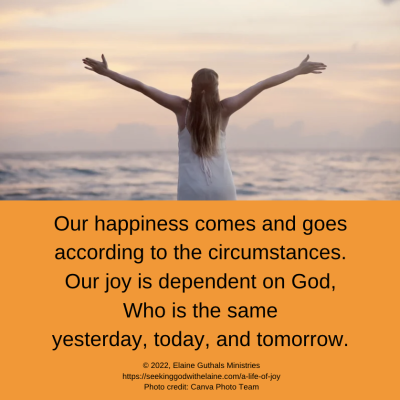Jesus knows our thoughts. This daily devotional looks at how Jesus knew to comfort the apostles by knowing what they were afraid to ask so that they could experience joy.
Nuggets
- We cannot hide our thoughts from Jesus.
- Jesus knew that the disciples would mourn His death, but that mourning would turn into joy.
- Happiness is from circumstances, but joy is a choice for God.
Devotions in the Living Life Connected to Christ series

The wedding is over! Everything went well. Our family and friends said they laughed, they cried, and they saw the love Pastor Steve and I have for each other.
It was a good day.
Now – hopefully – I can concentrate on getting all my devotions out right the first time. (I could have sworn that I had links in every one of the emails the first time. Apparently not.)
As we are coming up on Easter, I normally do an Easter series. I think this year, I am just going to concentrate on the verses we have for the Sunday Morning Bible Study.
As we look at last week’s lesson, we will finish up the Upper Room Discourse. The Easter Sunday lesson comes from Matthew and sees the women at the tomb.
So, let’s dig in with the victory we have in Jesus’ sacrifice.
Let's Put It into Context
Here is a running list of nuggets for the series.
Jesus Knows Our Thoughts
“Jesus knew that they wanted to ask him, so he said to them, ‘Is this what you are asking yourselves, what I meant by saying, “A little while and you will not see me, and again a little while and you will see me”?’” (Jn. 16: 19 ESV)
We cannot hide our thoughts from Jesus.
We’ve talked about this before. Jesus knows what is going on in our minds.
Glossary
We may think it is a dumb question. Jesus said, “No, ask it anyway.”
The only way we grow is to ask so that we are given the knowledge we need.
But think about Jesus in the Upper Room. He knew Judas’ thoughts. He knew Peter’s thoughts.
In the Garden of Gethsemane, Jesus knew every thought the apostles had. He knew which one was complaining about being cold. He knew which one was hating sleeping on the ground again.
Jesus knew which apostles were thinking of God and which ones weren’t. He knew if James and John had given up their quest to be the greatest.
Jesus knew they wanted to ask but didn’t want to be the one to ask.
Jesus Transforms Us
“Truly, truly, I say to you, you will weep and lament, but the world will rejoice. You will be sorrowful, but your sorrow will turn into joy” (Jn. 16: 20 ESV)
Jesus knew that the disciples would mourn His death, but that mourning would turn into joy.
For three years, the apostles had traveled around with Jesus. We have already talked about how Jesus has said that their relationship had turned from students to friends.
That means that Jesus had taken a special place in their hearts and lives. His death was going to feel like their hearts were pulled out of their chests and set on fire.
Jesus was no longer going to be physically present with them. That was going to take a lot of getting used to.
If that wasn’t bad enough, they had to witness Jesus painful and humiliating death. They knew the significance of a death on the cross. They also knew that Jesus didn’t deserve it.
But that isn’t all, either. True, they were misguided in thinking this, but they thought Jesus would usher in an earthly kingdom. They thought He would overthrow the Roman Empire.
To read a related devotion, click the button below.
How do we feel when something we are really looking forward to doesn’t live up to expectations? All our hopes and dreams are generally crushed.
We always say misery loves company. Jesus immediately followed up the prediction of misery with that of joy. “… I will turn their mourning into joy; I will comfort them, and give them gladness for sorrow” (Jer. 31: 13 ESV).
What was going to make it worse was that the world was going to be rejoicing. The world is used to identify any who has not been regenerated — in other words, has not ABCDed.
- Regeneration is being changed from spiritually dead to spiritually alive and the internal new birth and requickening that God brings about through the work of the Holy Spirit.
- Spiritual death is the separation from God that occurred as a consequence of Adam and Eve’s original sin.
- The spiritually alive are those who have ABCDed, so they are no longer separated from God.
- Spiritual death is the separation from God that occurred as a consequence of Adam and Eve’s original sin.
The ABCDs of Salvation
If you have not become a believer in Christ, please read through the
Plan of Salvation and prayerfully consider what God is asking you to do.
A – admit our sins
B – believe His Son Jesus is our Redeemer
C – confess God as Sovereign Lord
D – demonstrate that commitment by making any changes needed in our lives to
live the way in which God has called us
The Disciple’s Job Description
Glossary
Just think how you would feel if your best friend was publicly executed because of the wishes of the crowd. What if the crowd was partying in the streets while you mourned?
Throw another wrinkle into it. What if you were the cause of your friend’s death?
We are the reason Jesus died. He died to pay the price of your sin, and my sin, and everyone’s sin.
Because we all do sin.

The mourning of the apostles would turn into joy because Jesus would return. They had just gone over the I’m-going-away-I’m-coming-back bit. “A little while, and you will see me no longer; and again a little while, and you will see me” (Jn. 16: 16 ESV).
After the heartache of Jesus’ death, He told them that their friendship would be restored, and they would see Him conquer death.
All of the pain and humiliation of the cross would be gone.
No, they still didn’t understand at this point. Who would?
I mean, regeneration is a hard idea to grasp.
We know from the rest of Scriptures that the apostles figured it out. The church grew because of their efforts to spread the gospel.
Spurgeon said something interesting. He said that it wasn’t a trade of sorrow for joy. It was a transformation.
Resource
Ooo, baby. Isn’t that what happens to us when we accept Jesus as our Lord and Savior? We are transformed.
The Disciple’s Job Description
Complete Job Description
Transformation, like salvation, is a three-step process. That is because sanctification is a process.
Salvation is the gift of life through the deliverance from condemnation and sin to acceptance and holiness and changes us from being spiritually dead to spiritually alive.
- Sins are actions by humans that disobey God and break one of His reasonable, holy, and righteous laws and commandments, goes against a purpose He has for us, or follows Satan’s promptings.
- Holy means to be set apart — because of our devotion to God — to become perfect, and morally pure while possessing all virtues.
- Perfection means we reach a state of maturity because the combination of the spiritual graces form, when all are present, spiritual wholeness or completeness — holy, sanctified, and righteous.
- Spiritual graces are worldly morals that have been submitted to God to further His kingdom instead of enhancing this world.
- Sanctified means to be set free from sin.
- Righteous means we are free from sin because we are following God’s moral laws.
- Pure means not being sinful or having the stain of sin.
- Virtues are standards of moral excellence.
- Perfection means we reach a state of maturity because the combination of the spiritual graces form, when all are present, spiritual wholeness or completeness — holy, sanctified, and righteous.
- Holiness is the transcendent excellence of His nature that includes elements of purity, dedication, and commitment that lead to being set apart.
- Purity means possessing God’s moral character, having eliminated the stain of sin.
- Holy means to be set apart — because of our devotion to God — to become perfect, and morally pure while possessing all virtues.
Sanctification is the transformation of mind, body, and soul, which begins with regeneration; gradually changes our nature and morals through the promptings of the Holy Spirit; and ends with perfected state of spiritual wholeness or completeness.
Maclaren called it a blending or a becoming. In a way, I like the word blended as an illustration of how we are transformed. It is a gradual process.
Resources
But in a way, I don’t like blended. It isn’t that the two natures — spiritual nature and sinful nature — combine into a new nature.
God cuts out our sinful nature and transforms us to have a spiritual nature.
I think becoming is a much better word choice. It is a reversal.
That brings up a good point. Our sorrow will turn to joy — but that doesn’t mean that we will never have sorrow again.
We will.
But our sorrow will still be transformed to joy as we become closer to God.
Jesus Transforms Us
“When a woman is giving birth, she has sorrow because her hour has come, but when she has delivered the baby, she no longer remembers the anguish, for joy that a human being has been born into the world. So also you have sorrow now, but I will see you again, and your hearts will rejoice, and no one will take your joy from you” (Jn. 16: 20-22 ESV)
Happiness is from circumstances, but joy is a choice for God.
We can either choose to be sorrowful. Or we can choose to be joyful.
It depends on the status of our hearts. When we are secure in our relationships with God, we know that He has us in the palm of our hands.
Verse 22 takes up the sorrow — joy discussion again. Jesus told His apostles that He would see them again.
Jesus did see them for a short time after the resurrection. He then ascended to Heaven.
We know Jesus lives in our hearts (Eph. 3: 17) and watches over us from Heaven (Rom. 8: 34).
We also know that one day we will see Jesus. He will be returning on a cloud to get us.
We will live with Jesus for eternity if the status of our hearts are where they should be. Nothing — or no one — will take our salvation away from us when our hearts are right.
Verse 22 also says that no one will take our joy away from us. “… no one will take your joy from you” (Jn. 16: 22 ESV).
Our happiness comes and goes according to the circumstances. Our joy is dependent on God, Who is the same yesterday, today, and tomorrow.

Our joy is dependent on our faith. Faith is a gift from God that enhances the conviction that the doctrines revealed in God’s Word are true, even if we do not understand all aspects of them, a belief which impacts our lives and distinguishes us from others.
Glossary

Making the Connections
Spurgeon made a very interesting observation. He wrote, “It is most instructive that the apostles do not speak of the death of our Lord with any kind of regret. The Gospels mention their distress during their actual occurrence, but after the Resurrection, and Pentecost, we hear of no such grief; on the contrary, there are many expressions which treat of the Crucifixion in the spirit of exalting joy.”
Resource
Think about how many trials we go through that, even though when we are looking back on them to see how much we have grown, we are still sorry that they happened. We don’t want the bad stuff to happen — even if it ends up being something good.
Sometimes, the bad stuff does have to happen. We grow the most through those times.
How Do We Apply This?
- To keep the joy, we need to keep God’s laws and commandments.
- We lose the joy; God does not take it away from us.
Resource
Father God. Thank You for the joy that You give us. We can only experience this joy when we submit our hearts and lives to Jesus as our Savior and Redeemer. It is in His precious name we pray, Amen.
What do you think?
Leave me a comment below (about this or anything else) or head over to my Facebook group for some interactive discussion.
If you don’t understand something and would like further clarification, please contact me.
If you have not signed up for the email daily or weekly providing the link to the devotions and the newsletter, do so below.
If God has used this devotion to speak with you, consider sharing it on social media.